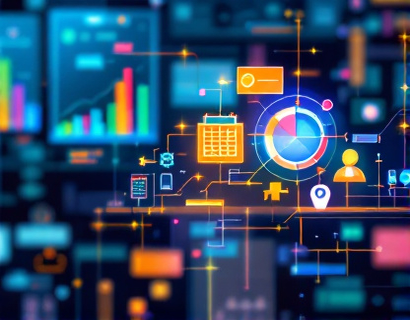AI-Driven Mental Health Navigator: Transforming Access to Psychiatric Services and Industry Knowledge
The integration of artificial intelligence in the mental health sector has paved the way for innovative solutions that enhance access to specialized insights and support. An AI-driven chatbot designed to navigate the complex landscape of psychiatric services and the mental health industry is revolutionizing how users interact with this critical field. This technology ensures that the information provided is not only accurate but also safe and appropriate for a diverse audience, including children, students, mental health enthusiasts, educators, and healthcare professionals.
Understanding the Need for Specialized Insights
The mental health industry is vast and intricate, encompassing a wide range of services from therapy and counseling to psychiatric evaluations and treatment plans. For individuals seeking information or assistance, navigating this landscape can be overwhelming. Traditional methods of accessing information, such as extensive research through medical journals or direct consultations with professionals, can be time-consuming and sometimes inaccessible to those who need it most. An AI-driven chatbot addresses these challenges by providing immediate, specialized insights into psychiatric services and industry knowledge, making reliable information more accessible than ever.
Ensuring Content Accuracy and Safety
One of the primary concerns when providing mental health information is ensuring its accuracy and safety. Misinformation can lead to misunderstandings and potentially harmful decisions. The AI chatbot is designed with robust content verification processes to guarantee that the information it provides is up-to-date, evidence-based, and comes from credible sources. This feature is particularly crucial for making the platform suitable for children and students, ensuring they receive safe and age-appropriate content. By filtering and verifying information, the chatbot empowers users to engage with mental health topics with confidence and responsibility.
Empowering a Diverse Audience
The chatbot serves a broad spectrum of users, each with unique needs and levels of understanding. For children and students, the platform offers simplified explanations and educational content, helping to demystify mental health concepts and encourage early awareness and understanding. Mental health enthusiasts and educators can access more detailed information, including the latest research findings and best practices in mental health care. Healthcare professionals benefit from a comprehensive resource that keeps them updated on industry trends, new treatments, and regulatory changes.
Specialized Information for Various User Groups
Children and Students: The chatbot provides age-appropriate content that introduces basic mental health concepts, signs of common mental health issues, and where to seek help. It uses simple language and engaging formats to ensure the information is accessible and understandable. Interactive elements, such as quizzes and games, make learning about mental health fun and interactive.
Mental Health Enthusiasts: For those with a deeper interest in mental health, the chatbot offers in-depth articles, case studies, and expert interviews. It covers a wide range of topics, from the latest therapeutic techniques to the impact of mental health on different demographics. Users can explore these topics at their own pace, with the option to delve deeper into specific areas of interest.
Educators: Educators can access curated resources and lesson plans that align with educational standards. The chatbot provides guidance on how to integrate mental health education into their curricula, along with tools to support students' emotional well-being. It also offers insights into recognizing and addressing mental health issues in the classroom.
Healthcare Professionals: Healthcare professionals benefit from a comprehensive database of psychiatric services, including provider directories, treatment options, and regulatory updates. The chatbot can assist in finding specialized care, understanding insurance coverage, and staying informed about the latest clinical guidelines and research.
Enhancing User Interaction with AI Technology
The AI chatbot uses advanced natural language processing (NLP) to understand and respond to user queries accurately. It can interpret complex questions and provide tailored responses, making the interaction feel natural and personalized. The chatbot continuously learns from user interactions, improving its ability to provide relevant and helpful information over time. This adaptive nature ensures that the platform remains a valuable resource, evolving with the needs of its users.
Building Trust Through Transparency
Trust is paramount in the mental health domain, and the chatbot addresses this by being transparent about its capabilities and limitations. Users are informed that while the chatbot provides reliable information, it is not a substitute for professional advice. For more complex or personalized issues, the chatbot directs users to seek help from qualified mental health professionals. This approach builds trust and ensures that users understand when to seek professional assistance.
Promoting Responsible Engagement
To foster responsible engagement, the chatbot includes features that encourage users to think critically about the information they receive. It provides sources for the information provided, allowing users to verify the data on their own. The platform also includes resources on digital literacy and mental health, helping users understand how to navigate online information safely and responsibly. By promoting these skills, the chatbot contributes to a more informed and cautious user base.
Supporting Mental Health Awareness and Education
The AI-driven chatbot plays a significant role in promoting mental health awareness and education. By making specialized information accessible to a wide audience, it helps break down stigmas and encourages open conversations about mental health. The platform can be integrated into schools, community centers, and healthcare settings to reach a broader audience. Educational campaigns and workshops can leverage the chatbot's resources to create impactful and informative sessions.
Case Studies and Success Stories
Several institutions have already integrated the AI chatbot into their mental health initiatives with positive results. A school district implemented the chatbot as part of its mental health education program, reporting increased student engagement and a better understanding of mental health topics. Healthcare providers have used the chatbot to streamline patient education and support, leading to improved patient satisfaction and outcomes. These success stories highlight the chatbot's potential to make a meaningful difference in the mental health landscape.
Future Developments and Innovations
The field of AI in mental health is rapidly evolving, and the chatbot is poised to incorporate new technologies and advancements. Future updates may include integration with wearable devices to monitor mental health indicators, enhanced virtual reality experiences for therapy simulations, and more sophisticated predictive analytics to identify at-risk individuals. These innovations will further enhance the chatbot's ability to provide comprehensive and personalized support.
Conclusion
The AI-driven mental health navigator represents a significant step forward in making specialized psychiatric services and industry knowledge accessible to all users. By ensuring content accuracy, safety, and appropriateness for a diverse audience, the chatbot empowers individuals to engage with mental health topics confidently and responsibly. As the technology continues to evolve, it holds the promise of transforming the way we approach mental health care and education, ultimately contributing to a healthier and more informed society.











































